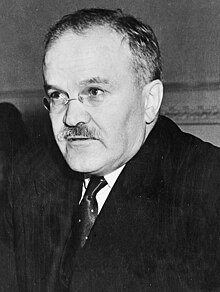
Back Wjatsjeslaf Molotof Afrikaans Vyacheslav Molotov AN فياتشيسلاف ميخائيلوفيتش مولوتوف Arabic فياتشيسلاف مولوتوف ARZ Viacheslav Mólotov AST Vyaçeslav Molotov Azerbaijani Молотов Вячеслав Михайлович Bashkir Вячаслаў Міхайлавіч Молатаў Byelorussian Вячаслаў Молатаў BE-X-OLD Вячеслав Молотов Bulgarian
Vyacheslav Molotov | |||||||||||||||||||||||||||||||||||||||||
|---|---|---|---|---|---|---|---|---|---|---|---|---|---|---|---|---|---|---|---|---|---|---|---|---|---|---|---|---|---|---|---|---|---|---|---|---|---|---|---|---|---|
Вячеслав Молотов | |||||||||||||||||||||||||||||||||||||||||
 Molotov in 1945 | |||||||||||||||||||||||||||||||||||||||||
| 3rd Premier of the Soviet Union | |||||||||||||||||||||||||||||||||||||||||
| In office 19 December 1930 – 6 May 1941 | |||||||||||||||||||||||||||||||||||||||||
| Leader | Joseph Stalin | ||||||||||||||||||||||||||||||||||||||||
| Preceded by | Alexei Rykov | ||||||||||||||||||||||||||||||||||||||||
| Succeeded by | Joseph Stalin | ||||||||||||||||||||||||||||||||||||||||
| 3rd First Deputy Premier of the Soviet Union | |||||||||||||||||||||||||||||||||||||||||
| In office 16 August 1942 – 29 June 1957 | |||||||||||||||||||||||||||||||||||||||||
| Premier |
| ||||||||||||||||||||||||||||||||||||||||
| Leader | Joseph Stalin Georgy Malenkov Nikita Khrushchev | ||||||||||||||||||||||||||||||||||||||||
| Preceded by | Nikolai Voznesensky | ||||||||||||||||||||||||||||||||||||||||
| Succeeded by | Nikolai Bulganin | ||||||||||||||||||||||||||||||||||||||||
| 3rd People's Commissar for Foreign Affairs | |||||||||||||||||||||||||||||||||||||||||
| In office 3 May 1939 – 15 March 1946 | |||||||||||||||||||||||||||||||||||||||||
| Premier | Joseph Stalin | ||||||||||||||||||||||||||||||||||||||||
| Leader | Joseph Stalin | ||||||||||||||||||||||||||||||||||||||||
| Preceded by | Maxim Litvinov | ||||||||||||||||||||||||||||||||||||||||
| Succeeded by | Himself (as Minister of Foreign Affairs) | ||||||||||||||||||||||||||||||||||||||||
| 1st and 3rd Minister of Foreign Affairs | |||||||||||||||||||||||||||||||||||||||||
| In office 15 March 1946 – 4 March 1949 5 March 1953 – 1 June 1956 | |||||||||||||||||||||||||||||||||||||||||
| Premier | |||||||||||||||||||||||||||||||||||||||||
| Leader | Joseph Stalin Georgy Malenkov Nikita Khrushchev | ||||||||||||||||||||||||||||||||||||||||
| Preceded by | Himself (as People's Commisar for Foreign Affairs) Andrey Vyshinsky | ||||||||||||||||||||||||||||||||||||||||
| Succeeded by | Andrey Vyshinsky Dmitri Shepilov | ||||||||||||||||||||||||||||||||||||||||
| |||||||||||||||||||||||||||||||||||||||||
| Personal details | |||||||||||||||||||||||||||||||||||||||||
| Born | Vyacheslav Mikhaylovich Skryabin 9 March 1890 Kukarka, Russian Empire (present day Sovetsk, Kirov Oblast, Russia) | ||||||||||||||||||||||||||||||||||||||||
| Died | 8 November 1986 (aged 96) Moscow, Russian SFSR, Soviet Union | ||||||||||||||||||||||||||||||||||||||||
| Resting place | Novodevichy Cemetery, Moscow | ||||||||||||||||||||||||||||||||||||||||
| Political party | |||||||||||||||||||||||||||||||||||||||||
| Spouse | |||||||||||||||||||||||||||||||||||||||||
| Relatives | Vyacheslav Nikonov (grandson) | ||||||||||||||||||||||||||||||||||||||||
| Awards | Order of the Badge of Honour | ||||||||||||||||||||||||||||||||||||||||
| Signature | |||||||||||||||||||||||||||||||||||||||||
Vyacheslav Mikhaylovich Molotov[a] (né Skryabin;[b] 9 March [O. S. 25 February] 1890 – 8 November 1986) was a Russian and later Soviet politician and diplomat, an Old Bolshevik, and a leading figure in the Soviet government from the 1920s onward. He served as Chairman of the Council of People's Commissars from 1930 to 1941 and as Minister of Foreign Affairs from 1939 to 1949 and from 1953 to 1956. He is considered to be one of the greatest diplomats in history.[1]
During the 1930s, he ranked second in the Soviet leadership, after Joseph Stalin, whom he supported loyally for over 30 years, and whose reputation he continued to defend after Stalin's death. As People's Commissar for Foreign Affairs in August 1939, Molotov became the principal Soviet signatory of the German–Soviet non-aggression pact, also known as the Molotov–Ribbentrop Pact. He retained his place as a leading Soviet diplomat and politician until March 1949, when he fell out of Stalin's favour and lost the foreign affairs ministry leadership to Andrei Vyshinsky. Molotov's relationship with Stalin deteriorated further, and Stalin criticised Molotov in a speech to the 19th Party Congress.
Molotov was reappointed Minister of Foreign Affairs after Stalin's death in 1953 but staunchly opposed Nikita Khrushchev's de-Stalinization policy, which resulted in his eventual dismissal from all positions and expulsion from the party in 1961 (after numerous unsuccessful petitions, Molotov was readmitted in 1984).[2] Molotov defended Stalin's policies and legacy until his death in 1986 and harshly criticised Stalin's successors, especially Khrushchev.
Cite error: There are <ref group=lower-alpha> tags or {{efn}} templates on this page, but the references will not show without a {{reflist|group=lower-alpha}} template or {{notelist}} template (see the help page).
- ^ Cite error: The named reference
:2was invoked but never defined (see the help page). - ^ Eaton, William J. (11 November 1986). "Molotov Dies; Key Stalin Aide: Ex-Foreign Minister, 96, Symbolized Cold War". Los Angeles Times. Retrieved 14 June 2022.
© MMXXIII Rich X Search. We shall prevail. All rights reserved. Rich X Search